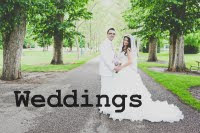Photo of my husband and I by our Uncle Todd
So now that I was a fresh-off-the-alter bride, I was ecstatic to help capture someone else's wedding day. Now I had done portrait sessions for about 11 months up until this time, but according to all of the web articles I had looked up, I was out of my mind to shoot a wedding by myself. Now that I was entirely freaked out, there I was in Montana with two cameras and multiple lenses. I had a Canon T2i and a Canon 40D, a 50mm 1.8, a 70-200mm 3.5, and an 18-55mm 3.5 lens and an external flash.
Now I need to make something really clear, those articles are right, shooting your first wedding is a huge, huge, deal. This day can never be repeated for those folks who are trusting you and you need to have full disclosure that you are new at this. I would highly recommend having a second shooter. I'm getting ahead of myself though.
Here's one of the portraits from my first wedding. I found this location the day before the wedding.
1. PLAN
I don't think I can emphasize this enough. I think the fact that I'm an organizational ninja makes photographing so much less stressful.You need to plan these things ahead:
1. The "Photography Schedule" of the wedding. Where is everyone going to be, what time you have to take photos during the ceremony/reception/before/after, what locations you are going to take photos, what poses you are going to use. This is your motherboard list during the wedding.
2. Group Shot poses- are there 2 bridesmaids or 7? How many and who are in the family shots?
3. Check out the lighting of all locations at the time you will be shooting the photos
4. What specific photographs does the bride and groom want?
5. Your specific location during each part of the ceremony.
6. Attend the Rehearsal dinner if possible- you can figure out a lot by going to this.
7. Plan which lenses you are going to need for each location. Rent/Borrow another lens or body
I found this field the night of the rehearsal dinner and envisioned this shot.
2. EQUIPMENT
At a MINIMUM this is the equipment that you need. It is imperative to be light-speed proficient at using all of it as well.
*2 Camera Bodies with extra batteries for each one
*External Flash (And diffuser if necessary) with extra batteries
*A portrait lens (I love the 50mm 1.8 and 17-55mm 2.8)
* A zoom lens
*A wide angle lens (I use the 17-55mm 2.8) a 18-55mm works great if the lighting is good
*Your planning notes on small 3x5 cards or someway they are easily accessible
3. SECOND SHOOTER/ASSISTANT
Having a second shooter or assistant is highly recommended. This person can carry your extra lenses and batteries, can hold and relay your notes for you, can get you water, can use a reflector (if you have one), and obviously your second shooter can be your second pair of eyes to shoot things going on that you can't, or to take the same photos in case you're worried about shutter speed/lighting etc. (*Make sure they know what they are doing if you are relying on them!)
4. BE CONFIDENT
Have a vision in mind for your photos [Talk to the bride and groom beforehand to find out what theirs' is!] and be confident in capturing that. Whether you need to crouch in the aisle, invade the dance floor, adjust lighting, have them adjust their poses, fixing their hair, whatever you need to do be confident. Group shots can be hard if no one is taking charge, so be prepared knowing what the shots are going to like and execute!
5. CAPTURE CANDIDS
The best moments during the wedding are the ones that you do not pose. Candid photos that are full of emotion will be sure to capture your clients hearts. I love this shot of the groom's parents following them down the aisle. The mom is so happy and sad at the same time it just touches your heart.
6. BE PERSONABLE AND FRIENDLY
If you love people and they love you back, it's going to make your job so much easier. Putting people at ease while you are photographing them results in better pictures, and more referrals! Take the time to get to know your clients before the wedding.
7. TELL A STORY
From the girls getting ready to the bride kissing her grandpa's cheek. Your job is to tell the story of their wedding day. This is one reason I LOVE wedding photography, capturing their story

















شركة تعقيم وتطهير الفجيرة
ReplyDeleteشركات تعقيم ضد كورونا في الفجيرة